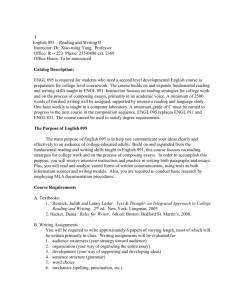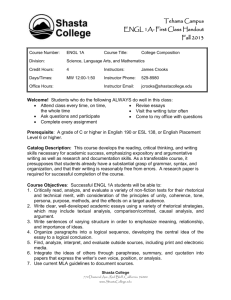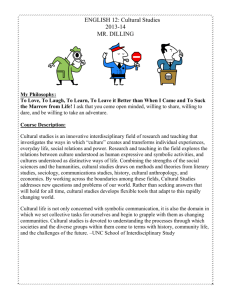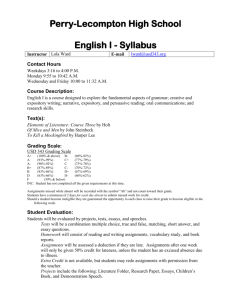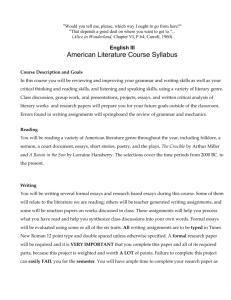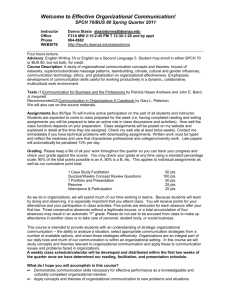SAMPLE - Integrated Syllabus
advertisement
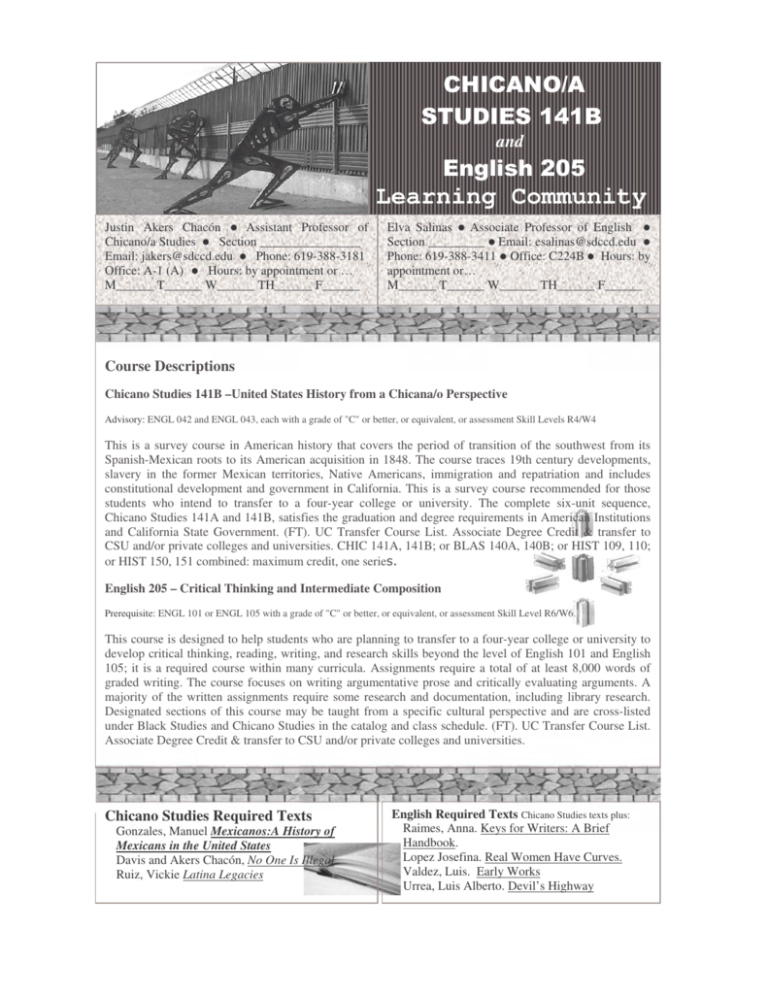
and Learning Community Justin Akers Chacón Assistant Professor of Chicano/a Studies Section ________________ Email: jakers@sdccd.edu Phone: 619-388-3181 Office: A-1 (A) Hours: by appointment or … M______ T______ W______ TH______ F______ Elva Salinas Associate Professor of English Section _________ Email: esalinas@sdccd.edu Phone: 619-388-3411 Office: C224B Hours: by appointment or… M______ T______ W______ TH______ F______ Course Descriptions Chicano Studies 141B –United States History from a Chicana/o Perspective Advisory: ENGL 042 and ENGL 043, each with a grade of "C" or better, or equivalent, or assessment Skill Levels R4/W4 This is a survey course in American history that covers the period of transition of the southwest from its Spanish-Mexican roots to its American acquisition in 1848. The course traces 19th century developments, slavery in the former Mexican territories, Native Americans, immigration and repatriation and includes constitutional development and government in California. This is a survey course recommended for those students who intend to transfer to a four-year college or university. The complete six-unit sequence, Chicano Studies 141A and 141B, satisfies the graduation and degree requirements in American Institutions and California State Government. (FT). UC Transfer Course List. Associate Degree Credit & transfer to CSU and/or private colleges and universities. CHIC 141A, 141B; or BLAS 140A, 140B; or HIST 109, 110; or HIST 150, 151 combined: maximum credit, one serie English 205 – Critical Thinking and Intermediate Composition Prerequisite: ENGL 101 or ENGL 105 with a grade of "C" or better, or equivalent, or assessment Skill Level R6/W6. This course is designed to help students who are planning to transfer to a four-year college or university to develop critical thinking, reading, writing, and research skills beyond the level of English 101 and English 105; it is a required course within many curricula. Assignments require a total of at least 8,000 words of graded writing. The course focuses on writing argumentative prose and critically evaluating arguments. A majority of the written assignments require some research and documentation, including library research. Designated sections of this course may be taught from a specific cultural perspective and are cross-listed under Black Studies and Chicano Studies in the catalog and class schedule. (FT). UC Transfer Course List. Associate Degree Credit & transfer to CSU and/or private colleges and universities. Chicano Studies Required Texts Gonzales, Manuel Mexicanos:A History of Mexicans in the United States Davis and Akers Chacón, No One Is Illegal Ruiz, Vickie Latina Legacies English Required Texts Chicano Studies texts plus: Raimes, Anna. Keys for Writers: A Brief Handbook. Lopez Josefina. Real Women Have Curves. Valdez, Luis. Early Works Urrea, Luis Alberto. Devil’s Highway Course Objectives: Upon successful completion of this course, students will be able to: • • • • • • • • • • • • Identify social, economic, cultural, and political forces influencing the development of the Mexican-American within the context of U.S. History. Identify and evaluate the causes and effects of Mexican migrations to the United States. Compare and contrast the immigration experience of the Mexican with that of European counterparts. Identify and analyze the contributions that Mexican-Americans have made to the development of the United States. Identify and analyze the Mexican-American as an active force in resistance to oppression. Analyze the relationship of the Mexican-American to history of California government and the relationships of state and local government with federal government. Learn about the developing field of Border Studies, which includes a survey of the history of the border and other issues such as globalization, environmental issues, immigration and acculturation. Identify and compare cultural differences between Mexican-Americans and Anglo-American culture with other major social and ethnic groups. Apply the principles of critical reasoning to the reading of complex and sophisticated material. Apply the principles of college- level academic writing to complex and sophisticated exposition and argumentation. Develop and demonstrate orally and in writing strong, focused, researched-based arguments on contemporary and academic topics, addressing competing viewpoints. Demonstrate in writing a sophisticated integration of a variety of research sources with appropriate documentation. Teaching Methodology The most effective and exciting class is one that involves everyone in the learning process. We will employ a number of techniques to engage students in the content of the course. This includes the use of texts, Power-point presentations and discussion-driven exercises. To encourage participation in the classroom, the “Socratic” approach towards teaching will be used. We will call upon individuals or groups to discuss and evaluate points made in the readings and other activities. In addition, we will use the “Multiple Intelligences” approach to designing a variety of projects and assignments for the e-class. The idea is to create a fully inclusive and multi-dimensional approach to teaching that appeals to different learning styles. This class is designed to help each student cultivate a multi-layered understanding of the content of history, based on a critical analysis of primary and secondary resources, narratives and testimonials, as well as personal experience. Lastly, the class will encourage students to develop and express their own opinions, as well as to encourage a critical analysis of how history has shaped our world today. Attendance This is primarily a lecture/discussion course and consistent and punctual attendance is required. Each class will require some note-taking as part of the preparation for exams and quizzes as well as assignments. If you are absent, you will be responsible for the materials missed in class and unable to make up assignments. Part of class grade will be based on attendance. We will assist you as best as we can, but in the final analysis, you will be responsible for the subject matter. Students who accumulate more than three unexcused absences may be dropped. Attendance will be taken at the beginning of class, 3 late arrivals equal one absence. Accommodations: Students with disabilities who may need academic accommodations should discuss options with me as soon as possible. The Disabled Students Program and Services (DSPS) page may provide more information: http://www.sdccdonline.net/dsps.htm ! "# Final Grade Schedule The following grading scheme will determine your final grade: • Exams (3) 32% 180 pts. possible • Class Project 16% 80 pts. possible • In-class Assign. 22% 110 pts. Possible • Reading Guides (5) 20% 100 pts. Possible • Attendance 10% 50 pts. Possible ------------------------------------------------------------------100% 500 pts. possible 440-500…………….A 390-440…………….B 340-390…………….C 290-340…………….D Below 290………….! Notes about the grading process… • • • • • • • No make-ups allowed or late work accepted (unless approved in advance with instructor) Extra Credit will be offered over the course of the semester (maximum 20 points per student) To provide for creativity and flexibility, I reserve the right to make adjustments on the grading scheme. Final grades will be assigned according to the number of points accumulated. More specific guidelines for class activity listed in “Assignment Checklist” below. All homework assignments will be announced well in advance of due dates. If you are absent, you are responsible for obtaining information missed in class. Field trips and outside activities will be incorporated into the curriculum of the class, occurring during regularly scheduled class hours. All students are required to consult teacher at least once by ___________. Final Grade Schedule The following grading scheme will determine your final grade: 1. Four Essays 90 points each………………………...75% (Narrative, Cause/Effect, Compare/Contrast, Argumentation) 360 points 2. Class Assignments……………………………… 20% 100 points 3. Presentation…………………………………………5% 40 points --------------------------------------------------------------------------------100% 500 points 440-500…………….A 390-440…………….B 340-390…………….C 290-340…………….D Below 290………….! Each student will prepare a total of four essays worth 90 points each. One 3 page narrative, two of approximately 1500 words each. This approximates to a 5-7 page paper (MLA style); works cited sheet not included. These papers will take a critical look at a social, political, or historical aspect of one of the themes discussed within readings. I must approve a proposal before students may begin developing essay. The first two essays must go through the peer editing process (workshops are worth 50 pts. Each) It is the student’s responsibility to bring adequate copies of their essays for their editing group. Failure to do so will affect your grade. The first two essays may be revised. (Further instruction / preparation will be given for proposal). Students will also prepare one 8-10 page Final Essay, (MLA Style). This essay will not be revised. There will also be a series of unannounced reading assessments / critical responses on the research and textual assignments of our course. These assessments will require purely summative responses of approximately 250 words to a question I pose. They will be conducted at the beginning of class on that day’s required work. 10 points each. Students are required to attend at least three cultural events that focus on Chicano/a issues. A two page double spaced analysis of the event is required to receive credit. There are several events included in the class schedule. 10 points each. IMPORTANT DATES TO REMEMBER Class Dates/Holidays: • Last day of classes_______ • No Class days: _______ _______ _______ Deadlines • Last Day to drop w/o “W”________ • Last day to petition for Credit/No Credit____ • Withdrawal Deadline_______ Exam Dates • Exam #1 _______ • Exam #2 _______ • Exam #3 _______ Important Campus Resources Writing Center………………………..C-226 Tutoring Center……………………….L-214 Counseling............................................A-110 Student Health………………………..A-116 Disabled Support Programs /Services...A-115 Financial Aid…………………………A-113 Transfer/Career Center……………….A-111 Research Paper: First Draft_______ Final_______ Service Learning Presentations: First________ Second________ Final _________ Class Rules 1. The classroom is a place where ALL should be comfortable and feel welcome. 2. Act respectfully to the teacher and your classmates. 3. Conduct yourself in a courteous and professional manner, refrain from any language or behavior that others might find offensive or discriminatory. 4. This classroom is welcoming to all, diversity will be celebrated and discrimination of any sort will not be tolerated. This classroom will respect diversity based on race, ethnicity, gender, religion, and sexual orientation. 5. Please refrain from talking when others are speaking. 6. Turn off CELL PHONES and other devices before entering class. Off and away while in the class. Students violating this rule may be asked to leave for the day. 7. Do not leave the class unless it is an emergency. 8. Do not engage in any activity not related to this class while in the classroom. 9. Come to class prepared. Bring materials and be ready with homework assignments. 10. Academic Honesty will be strictly enforced. Students are expected to be honest and ethical at all times in their pursuit of academic goals in accordance with Policy 3100, Student Rights, responsibilities and Administrative Due Process. Procedure 3100.3 describes the Academic and Administrative Sanctions for Students who are found to be cheating. A copy of Procedure 3100.3 can be obtained in the Office of the Vice President of Student Services. Honor’s Contracts Available: Students who sign an honor’s contract must work collaboratively with each other on a community project that will bring awareness to a social issue. Three 10-page research essays are required, class presentations, and community outreach. Example: Fall 2005-Honor’s Project Honor’s students have decided to form a student club called Reality Speaks. Their first project is a documentary entitled Fences and focuses on the Mexican/U.S. border. They intend to create a multi-voiced film documenting current immigration sentiment, legislative efforts targeting migrant workers, and vigilante activities directed at economic refugees from Mexico. This documentary will be shown in class on December 13 as a final project along with an essay recording their efforts, successes, and struggles during the creation of this film. They are responsible for marketing this film to create a “neutral” audience and for providing a guest speaker related to their project. Community outreach: This film will be available for use by other Professors and students and will be shown at an off campus location.


